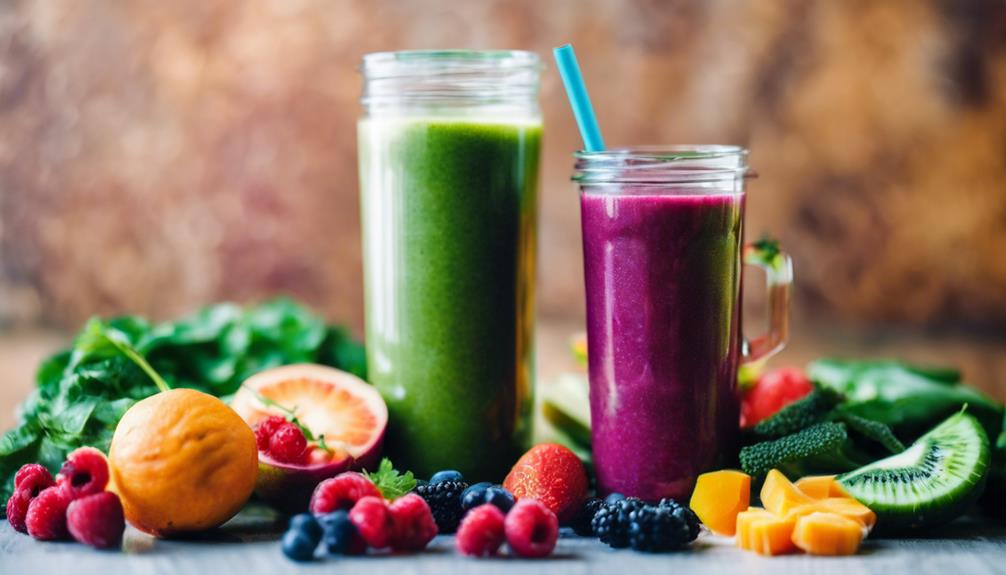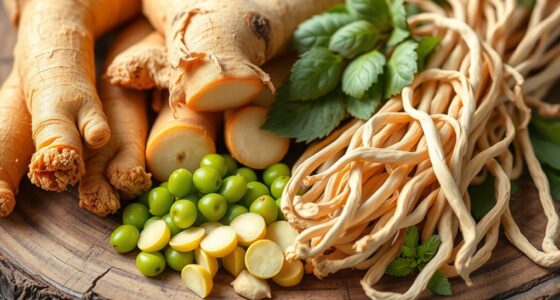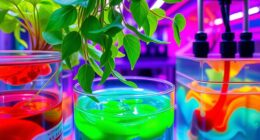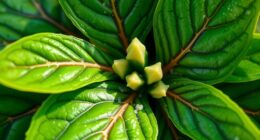To combat skin aging caused by inflammation, you can use herbs like turmeric, chamomile, and calendula that naturally lower IL-6 and IL-8 levels. These herbs contain bioactive compounds like curcumin and antioxidants that reduce inflammation, helping improve skin elasticity and calm redness. Incorporating herbal extracts or oils into your skincare routine boosts healing and resilience. Continue exploring how these natural remedies work and the best ways to maximize their benefits for healthier, youthful skin.
Key Takeaways
- Herbs like turmeric, chamomile, and calendula contain bioactive compounds that inhibit IL‑6 and IL‑8 production, reducing inflammation.
- Polyphenol-rich herbs help lower inflammatory cytokines, protecting skin from oxidative stress and slowing aging signs.
- Proper herbal extraction methods, such as infusions and tinctures, enhance the potency of anti-inflammatory compounds.
- Regular topical application of herbal extracts calms redness, soothes irritation, and supports skin resilience against inflammation.
- Combining herbs with skincare routines amplifies anti-inflammatory effects, promoting healthier, younger-looking skin.
Understanding the Role of IL‑6 and IL‑8 in Skin Aging
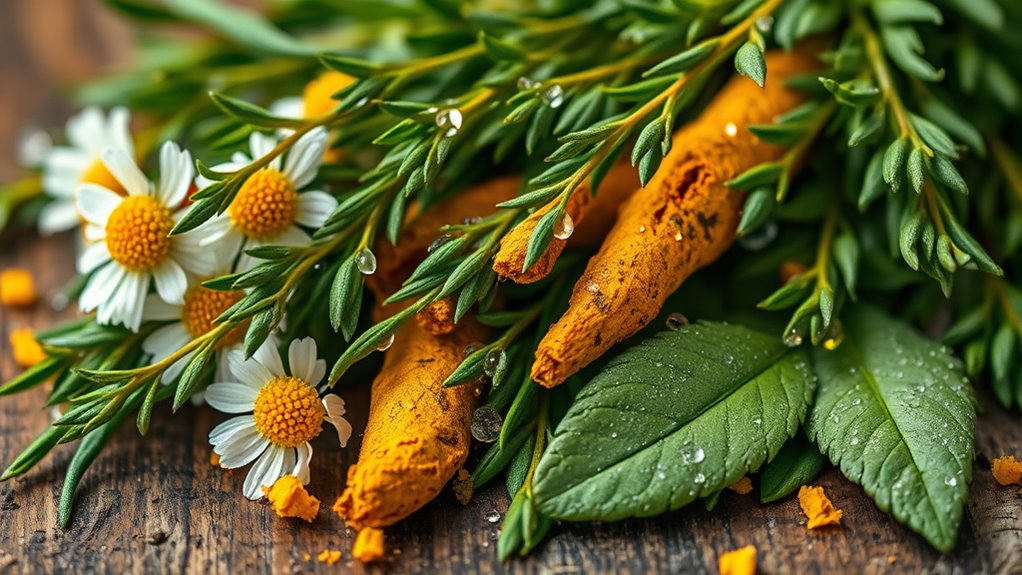
Inflammation plays a essential role in skin aging, with cytokines like IL-6 and IL-8 actively contributing to this process. These cytokines influence cytokine signaling pathways, which regulate immune modulation in your skin. When IL-6 and IL-8 levels increase, they promote chronic inflammation, leading to breakdown of collagen and elastin fibers, fundamental for skin firmness and elasticity. This persistent inflammatory response accelerates wrinkle formation and skin sagging. By understanding how these cytokines affect immune modulation, you can see how inflammation directly impacts your skin’s aging process. Elevated IL-6 and IL-8 not only signal immune cells to respond but also perpetuate inflammation, creating a cycle that damages skin structure over time. Managing cytokine signaling could be key to slowing down skin aging caused by inflammation. Additionally, cytokine signaling pathways play a crucial role in regulating immune responses that influence skin health. Furthermore, understanding the inflammatory cascade helps in developing targeted herbal interventions to mitigate these effects, especially those that can modulate cytokine production to reduce inflammation.
The Power of Herbal Anti-Inflammatories
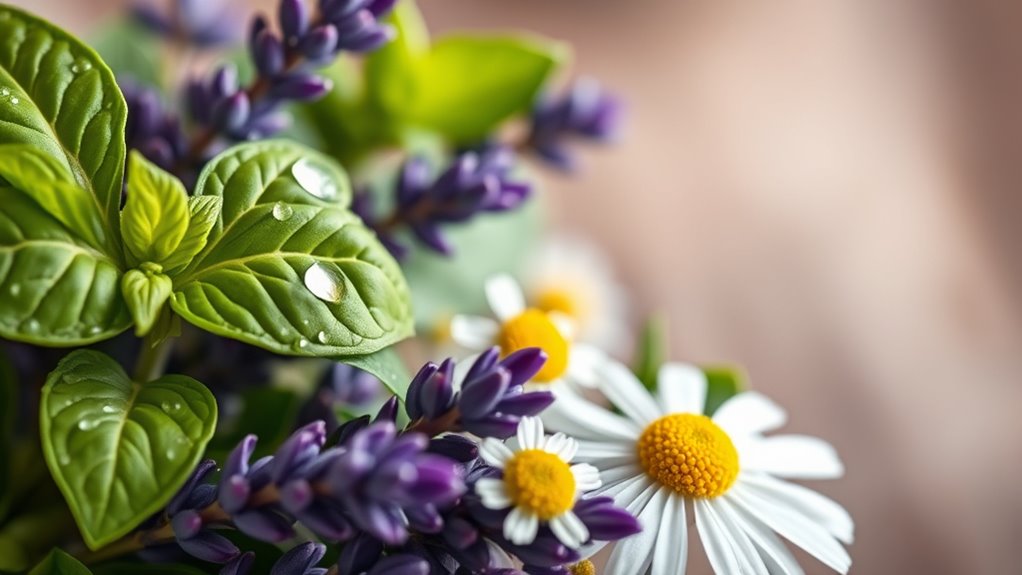
Herbal anti-inflammatories offer powerful natural options to reduce skin inflammation and slow aging. Many herbs are rich in polyphenols, which help protect your skin from oxidative stress. When combined with your skincare routine, these botanicals can enhance overall skin health and radiance. Additionally, incorporating herbs with proven anti-inflammatory properties can support Vetted – Flat Iron Bike performance, demonstrating their broad benefits for health and vitality. Regular use of herbal anti-inflammatories may also improve glycolic acid efficacy by reducing inflammation-related skin issues, leading to a more youthful complexion. Recognizing the importance of cultural significance in traditional herbal practices can guide you toward more effective and meaningful skin care choices.
Natural Anti-Inflammatory Agents
When it comes to combating skin aging caused by inflammation, natural anti-inflammatory agents found in herbs offer a powerful and accessible solution. You can maximize their benefits through various herbal extraction methods, which preserve active compounds and enhance potency. Traditional herbal remedies have been used for centuries, harnessing plants like turmeric, ginger, and chamomile for their soothing properties. These herbs contain bioactive compounds that reduce inflammation by lowering IL-6 and IL‑8 levels, helping to protect your skin from aging signs. Incorporating these remedies into your skincare routine or diet allows you to tap into nature’s healing power. Understanding herbal extraction methods ensures you’re getting the most effective extracts, making herbal anti-inflammatories a reliable, natural way to combat inflammation-induced skin aging. Additionally, awareness of herbal potency preservation techniques can further optimize their anti-inflammatory effects. Proper herbal storage is also essential to maintain the efficacy of herbal anti-inflammatories over time. Employing standardized herbal preparations can help ensure consistent potency and therapeutic benefits. Moreover, selecting herbs with high bioavailability can significantly improve their effectiveness in reducing inflammation.
Herbs Rich in Polyphenols
Herbs rich in polyphenols stand out as potent natural allies in fighting skin aging caused by inflammation. These compounds offer powerful polyphenol effects, helping to reduce IL‑6 and IL‑8 levels. When you opt for herbal extraction, you maximize these benefits, ensuring you get concentrated anti-inflammatory properties. Polyphenols combat oxidative stress, improve skin elasticity, and slow down cellular aging. Incorporating these herbs into your routine can enhance your skin’s resilience against environmental damage. Hackathons provide an innovative platform for developing new herbal formulations and research collaborations that can advance anti-inflammatory skin treatments.
Synergy With Skin Care
Harnessing the power of herbal anti-inflammatories can considerably amplify your skincare routine’s effectiveness. When you incorporate herbal formulations into topical applications, you enhance their ability to combat inflammation and promote healthier skin. These natural ingredients work synergistically with your skincare products, targeting IL-6 and IL-8 to reduce inflammation. To understand this synergy better, consider the following:
| Herbal Formulations | Skin Benefits | Application Methods |
|---|---|---|
| Turmeric | Reduces redness, soothes skin | Topical creams, serums |
| Green Tea Extract | Antioxidant, anti-inflammatory | Toners, masks |
| Licorice Root | Brightens, calms skin | Serums, moisturizers |
| Chamomile | Reduces irritation | Creams, compresses |
Using these herbs in your skincare routine enhances anti-inflammatory effects and promotes youthful, resilient skin. Additionally, incorporating ingredients that support skincare innovation can further boost the effectiveness of herbal anti-inflammatories.
Top Herbs for Combating Skin Inflammation
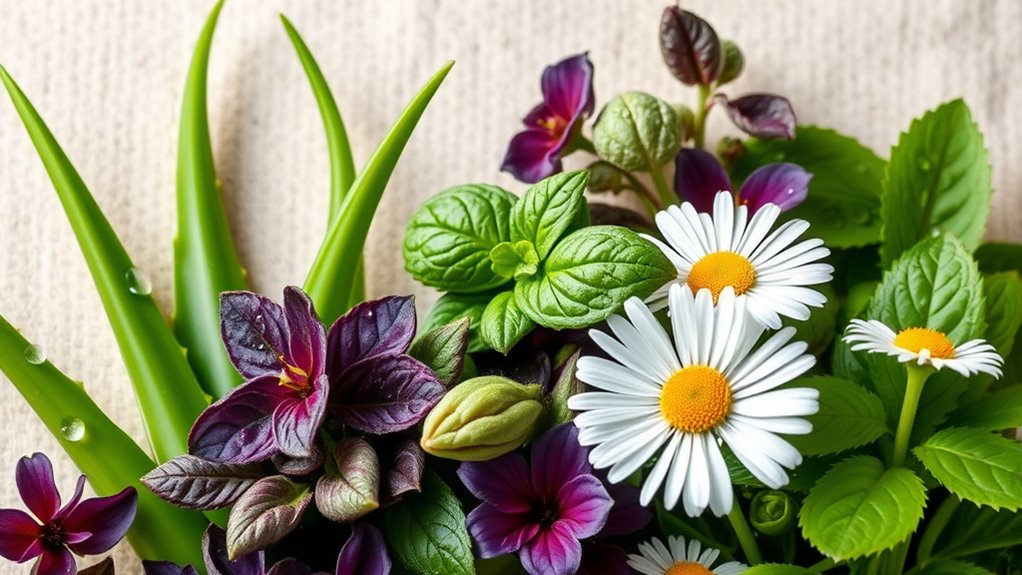
You can harness the power of certain herbs to soothe skin inflammation effectively. These herbs calm redness and irritation while providing natural anti-inflammatory benefits. Incorporating them into your routine can help protect your skin from aging caused by chronic inflammation. Understanding the steps to become a knowledgeable herbalist can also enhance your ability to select the most effective remedies. Recognizing patterns in healing can lead to more targeted and successful herbal treatments, especially when considering carrier oils to ensure safe and effective application. Additionally, being aware of types of air purifiers and their benefits can improve indoor air quality, which may also influence skin health by reducing pollutants that contribute to inflammation. Being mindful of scientific inquiry into herbal efficacy can further support your choices in natural remedies.
Herbs That Calm Skin Inflammation
When dealing with skin inflammation, incorporating calming herbs into your skincare routine can make a noticeable difference. Herbal tea remedies are a soothing way to reduce redness and irritation from within. Aromatherapy essential oils like chamomile or lavender can also promote calmness and healing when diffused or diluted for topical use. These herbs help soothe inflamed skin cells, decreasing cytokines like IL-6 and IL-8. You can sip chamomile or green tea to calm internal inflammation or apply diluted essential oils to target problem areas. Consistent use of these natural remedies supports skin recovery and reduces flare-ups. Keep in mind, gentle application and proper dilution are key for safe, effective results. Incorporate these herbs regularly for a calmer, healthier complexion.
Herbal Anti-Inflammatory Power
Certain herbs stand out for their powerful anti-inflammatory properties, making them effective allies in calming irritated skin. These herbs contain plant extracts and herbal formulations that target inflammation at its source, reducing IL-6 and IL-8 levels. Imagine a collection of potent remedies working synergistically to soothe your skin. Visualize the following:
| Herb | Key Plant Extracts | Benefits |
|---|---|---|
| Turmeric | Curcumin | Reduces redness, inflammation |
| Green Tea | Epigallocatechin gallate | Combats oxidative stress |
| Licorice Root | Glycyrrhizin | Calms irritation |
These natural options serve as effective, gentle ways to fight skin inflammation, promoting a healthier, youthful appearance. Research supports the use of 16PF in personal development and understanding individual traits, making these herbs promising options for holistic skin care.
Incorporating Herbs Into Your Skincare Routine
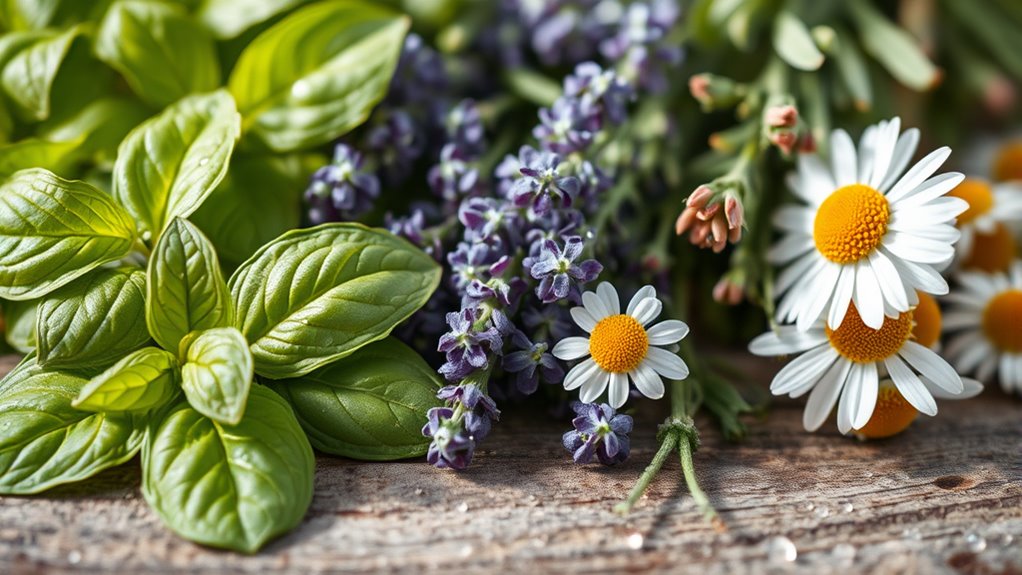
Incorporating herbs into your skincare routine can provide powerful anti-inflammatory benefits that support healthy, youthful skin. To maximize their effects, consider using herbal extraction methods like infusions, tinctures, or oils, which preserve active compounds. Traditional herbal formulations often combine multiple herbs for synergistic benefits, enhancing their anti-inflammatory properties. You can add herbal infusions directly to your cleansers or toners, or apply herbal oils and extracts as serums. Incorporate herbs like chamomile, calendula, or turmeric, known for reducing inflammation and promoting skin health. When selecting herbs, choose those prepared through traditional methods to guarantee potency and purity. Using herbal extraction methods like infusions or tinctures can significantly improve the bioavailability of active compounds, leading to more effective results. Employing traditional preparation techniques ensures you retain the full spectrum of herbal benefits, maximizing their healing potential. Consistent use of these herbal-based products can help calm skin, reduce redness, and slow signs of aging naturally. Additionally, incorporating anti-inflammatory compounds such as flavonoids and polyphenols from herbs can further enhance skin resilience and combat oxidative stress. Figurative language techniques can also be used to enhance the descriptive appeal of herbal formulations and their benefits.
Scientific Evidence Supporting Herbal Benefits
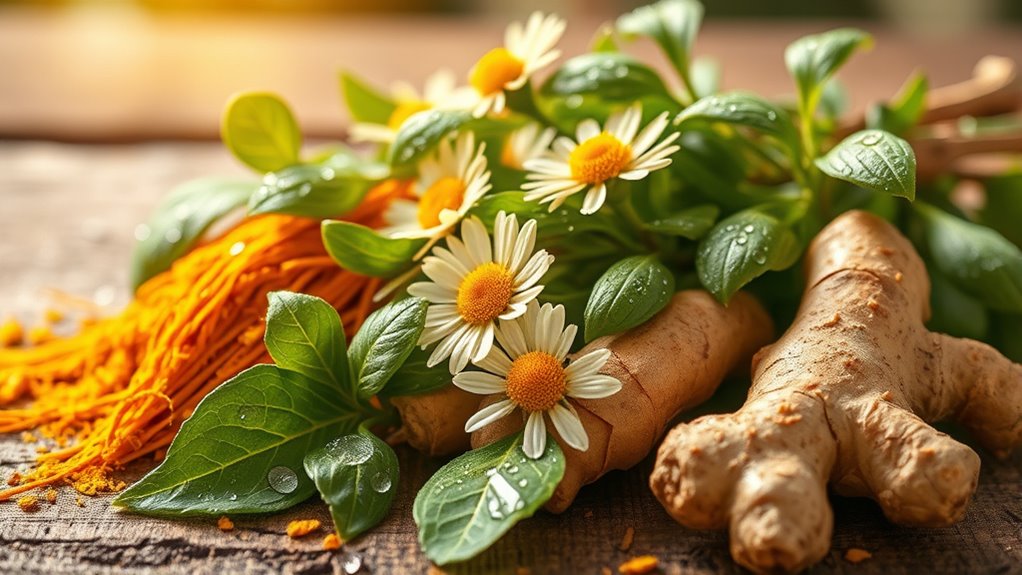
Numerous scientific studies have validated the anti-inflammatory properties of herbs like chamomile, turmeric, and calendula, confirming their benefits for skin health. Herbal extract studies demonstrate these plants can effectively reduce IL-6 and IL-8 levels, key markers of inflammation linked to skin aging. Clinical trial results support these findings, showing improved skin elasticity, reduced redness, and fewer wrinkles after topical or oral herbal applications. For example, turmeric’s curcumin compound has been shown in multiple trials to suppress inflammatory cytokines, promoting healthier skin. Similarly, chamomile extracts have demonstrated antioxidant and anti-inflammatory effects in clinical settings. These evidence-based results confirm that incorporating these herbs into your skincare routine can help combat inflammation-driven skin aging, making herbal treatments a scientifically supported option for maintaining youthful, resilient skin.
Tips for Maximizing Herbal Effects on Skin Health

To maximize the benefits of herbal treatments for your skin, it is vital to apply them consistently and correctly. Start by choosing high-quality herbal extracts made with effective herbal extraction methods to guarantee potency. Pay attention to herbal supplement dosages; following recommended amounts helps prevent side effects and boosts efficacy. Incorporate herbs into your routine regularly rather than sporadically. Consider combining topical applications with internal supplements for a synergistic effect. Keep track of your skin’s response to adjust dosages accordingly. Additionally, consult with a healthcare professional to tailor herbal use to your specific needs. Proper storage of herbs also preserves their active compounds, maximizing their impact on reducing inflammation and promoting skin health.
- Use high-quality herbal extracts with proven extraction methods
- Follow recommended herbal supplement dosages
- Maintain consistency in application and intake
- Store herbs properly to preserve potency
Frequently Asked Questions
Can Herbal Remedies Completely Reverse Skin Aging Caused by Inflammation?
Herbal remedies can support skin health and slow aging signs, but they can’t completely reverse skin aging caused by inflammation. Their efficacy varies, and they work best when combined with a healthy lifestyle. You might see improvements in skin texture and elasticity, but full aging reversal isn’t realistic. Use herbs as part of a holistic approach for healthier, more youthful skin, understanding they mainly aid aging management rather than total reversal.
Are There Any Side Effects From Long-Term Use of Anti-Inflammatory Herbs?
While anti-inflammatory herbs can benefit your skin, long-term use may pose risks. You might face herbal toxicity if you overlook proper dosage safety, leading to side effects like nausea or liver issues. Always follow recommended dosages, and consult a healthcare professional before extended use. Juxtaposing benefits with potential risks highlights that cautious, informed use guarantees you enjoy herbal advantages without unintended harm.
How Do Herbs Compare With Conventional Anti-Aging Skincare Products?
Herbal potency varies, but many herbs offer natural anti-inflammatory benefits that can complement skincare formulations. Unlike conventional anti-aging products, herbs often have fewer synthetic chemicals, reducing potential side effects. You might find herbal remedies gentler and more holistic, supporting skin health over time. However, their effectiveness depends on proper formulation and consistency. Combining herbs with your skincare routine can enhance anti-aging efforts without the risks associated with some synthetic ingredients.
Is It Necessary to Consult a Healthcare Professional Before Using Herbal Treatments?
Think of herbal treatments as a journey through uncharted waters—you wouldn’t navigate without a map or guide. It’s essential to consult a healthcare professional first because herbal safety isn’t always guaranteed, and some herbs may interact with medications or underlying conditions. Professional guidance helps ensure you avoid potential risks, keeping your skin and health safe as you explore natural remedies. Never skip consulting before diving into herbal treatments.
Which Herbs Are Most Effective for Sensitive Skin Types?
If you have sensitive skin, herbal extracts like chamomile, calendula, and oat extract work best. They soothe skin sensitivity, reduce redness, and calm irritation effectively. Always look for gentle, natural options and patch-test new products before regular use. Remember, everyone’s skin reacts differently, so consulting a healthcare professional is wise if you’re unsure about specific herbal extracts or if you have allergies.
Conclusion
By embracing these herbs, you can turn back the clock and tame inflammation’s fiery grip, much like a gentle rain calms a storm. Remember, nature’s pharmacy holds secrets to youthful skin, whispering promises of reduced IL‑6 and IL‑8. With consistent care and mindful choices, you become the artist shaping your skin’s story—painting hope where aging once cast shadows, and revealing the timeless power lurking within nature’s healing embrace.



